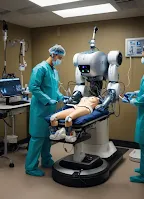OUR HEALTH WITH AI (PART 1)
Advancements in Cancer Detection: AI Surpasses Doctors by 17%, UCLA Study Finds
In the realm of medical diagnostics, artificial intelligence (AI) continues to push boundaries and redefine the standard of care. A recent study conducted by UCLA(University of California Los Angeles) has revealed groundbreaking findings that AI can detect cancer with an astonishing 17% higher accuracy compared to human doctors. This milestone not only underscores the potential of AI in revolutionizing healthcare but also highlights significant implications for improving patient outcomes and streamlining diagnostic processes.
The Promise of AI in Medicine
Artificial intelligence has rapidly emerged as a powerful tool in various fields, and its application in medicine holds immense promise. Unlike human doctors, AI algorithms can analyze vast amounts of data at unprecedented speeds, identifying subtle patterns and anomalies that may elude even the most experienced physicians. This capability is particularly crucial in oncology, where early and accurate detection can significantly impact treatment success rates and patient survival.
The UCLA Study: Methodology and Key Findings
Led by a team of researchers at UCLA, the study aimed to compare the diagnostic accuracy of AI systems with that of trained medical professionals across various types of cancer. The researchers utilized a diverse dataset comprising anonymized medical records, imaging scans, and pathology reports to train and validate their AI models.
The results were striking: AI consistently outperformed human doctors by detecting cancerous lesions and abnormalities with a remarkable 17% higher accuracy. This statistical advantage is not merely a marginal improvement but represents a substantial leap forward in diagnostic precision.
How AI Achieves Superior Accuracy
The superior performance of AI in cancer detection can be attributed to several key factors:
1.Data Processing Power: AI algorithms can analyze vast datasets and learn from millions of images and patient records, enabling them to recognize subtle patterns indicative of cancerous growths.
2.Pattern Recognition: AI excels in recognizing patterns and deviations that might be missed by human perception, thereby enhancing sensitivity and reducing false negatives in diagnostics.
3.Consistency and Speed: Unlike human doctors who may experience fatigue or variability in performance, AI operates consistently and can deliver results swiftly, accelerating the diagnostic process.
Implications for Healthcare
The implications of AI's heightened accuracy in cancer detection are profound and multifaceted:
1.Early Detection: AI's ability to detect cancer earlier and with greater accuracy can lead to earlier interventions and potentially more effective treatments, thereby improving patient outcomes and survival rates.
2.Personalized Medicine: By analyzing individual patient data and genetic profiles, AI can contribute to the development of personalized treatment plans tailored to each patient's unique biology and disease characteristics.
3.Resource Optimization: Streamlining diagnostic processes with AI can alleviate the burden on healthcare systems, reduce waiting times for patients, and optimize the allocation of medical resources.
Challenges and Ethical Considerations
While AI presents transformative opportunities in cancer detection, several challenges and ethical considerations must be addressed:
1.Algorithm Bias: Ensuring AI algorithms are trained on diverse and representative datasets to mitigate biases and disparities in healthcare outcomes.
2.Patient Privacy: Safeguarding patient data and ensuring compliance with privacy regulations amid the increased use of AI in medical diagnostics.
3.Integration into Clinical Practice: Overcoming barriers related to acceptance, training, and integration of AI technologies into existing clinical workflows and healthcare practices.
Future Directions and Research
The UCLA study marks a significant milestone in the ongoing evolution of AI in healthcare, but it also serves as a springboard for future research and innovation:
1.Enhanced AI Capabilities: Continued refinement and enhancement of AI algorithms to further improve accuracy, reliability, and applicability across different types and stages of cancer.
2.Multi-Modal Integration: Exploring AI's potential in integrating data from various diagnostic modalities (e.g., imaging, genomics, biomarkers) to enhance comprehensive cancer diagnostics.
3.Global Impact: Extending AI's reach to underserved regions and populations, thereby democratizing access to advanced healthcare technologies and improving global health outcomes.
The UCLA study heralds a new era in cancer detection, where AI surpasses traditional methods with a 17% increase in accuracy. This advancement not only showcases AI's potential to transform diagnostics but also underscores the urgent need for collaboration between researchers, clinicians, and policymakers to harness its full potential responsibly.
In summary, the journey towards leveraging AI for improved cancer detection is not just about technological prowess but about leveraging innovation to make tangible improvements in the lives of patients worldwide. The UCLA study is a testament to this progress and a beacon of hope for the future of oncology diagnostics.
Thanks for reading,
Have a nice day. 😊










Comments
Post a Comment